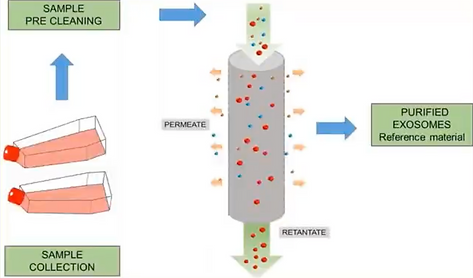top of page

MSC Exosome
Production & Quality

Where does our MSC Exosomes come from?
REWYNE's Exosome material came from a US company that was founded in 1925, ATCC is a nonprofit global biological resource center based in Manassas, Virginia, renowned for supplying authenticated biological materials. It specializes in providing high-quality exosome products from cancer cell lines and mesenchymal stem cells, supporting cutting-edge research in exosome biology, diagnostics, and drug delivery. Below are some background information of this global biological resource center.
History
Founded in 1925 as a nonprofit to centralize microorganism collections for scientific research; key milestones include adopting freeze-drying in 1938, becoming the National Cancer Institute’s cell line repository in 1959, accepting patent deposits under the Budapest Treaty since 1981, earning ANSI accreditation for standards in 2007, publishing cell authentication guidelines in 2012, and supporting COVID-19 research with RNA constructs and viral isolates since 2019.
Expertise
Specializes in authenticating and distributing cell lines, microorganisms, molecular tools, and nucleic acids, serving life science research, diagnostics, drug discovery, and toxicology.
Accomplishments
Manages the world’s largest and most diverse biological collections, supports global health through collaborations with governments, industry, and academia, and advances research in fields like HIV/AIDS via reagent programs since 2021.
Size
Employs 500–1,000 staff, generates ~$177 million in annual revenue, with 75% U.S. customers and 25% international (6% government entities).
Influence in Exosome Field
Pioneers isolation of pure, sterile exosomes from cancer cell lines (prostate, colorectal, lung) and mesenchymal stem cells, providing standardized products for diagnostics, early cancer detection, non-invasive drug delivery, and functional studies in exosome biology and cell communication.

Pure Excellence in Every Exosome
Exosomes and Extracellular Vesicles

-
Cell-dervied
-
Present in all biologial fluids
-
30-200nm with lipid bilayer
-
Serve as "cargo" for RNA and protein molecules
-
Diverse functions:
- Cellular communication
- Waste product management
A Platform for Exosomes Isolation and Quality Control

ATCC Authenticated Cell Lines

ATTC's TFF Exosomes Isolation Strategy
Quality Control for Each Lot of Production
Attributes | Test | Specification |
|---|---|---|
Mycoplasma | PCR based assay | Negative |
Sterility | Bacteria, yeast, fungi | Sterile |
Protein Marker expression | Western Blotting | Transmembrane and cytosolic proteins |
Size distribution
(% particle within 50-200nm) | NTA analysis | Cell type dependend |
Particle number/vial | NTA analysis | ≥ 10^9 particles |
Protein concentration/vial | BCA assay | Approimately 100µg |
Comparison of ATCC and Competitor Exosomes
Product Attributes | REWYNE | Competitor H | Competitor A | Competitor B | Competitor Z |
|---|---|---|---|---|---|
F/L* | F | L | F | F | F |
FD* | ✓ | ✗ | ✓ | ✓ | ✓ |
PV* | ✓ | ✗ | ✗ | ✗ | ✗ |
MV* | ✓ | ✓ | ✗ | ✗ | ✗ |
DSR* | ✓ | ✗ | ✗ | ✗ | ✗ |
F/L* -- Frozen or Lyophilized
FD* -- Functional Data
PV* -- Particle Verification
MV* -- Marker Verification
DSR* -- Defined Size Range
PA* -- Product Attributes
R* -- REWYNE
C*H -- Competitor H
C*A -- Competitor A
C*B -- Competitor B
C*Z -- Competitor C
Characterization of TFF-Purified Exosomes
Size Distribution Analysis via NTA

MSC Exosomes Lot 1

MSC Exosomes Lot 2
Cell Type | Particle Number | % Particles Between 50-200nm Size Range |
|---|---|---|
MSC Exosomes Lot 2 | 6.1 x 10^10 particles/mL | 96.1 |
MSC Exosomes Lot 1 | 4.1 x 10^10 particles/mL | 90.7 |
Consistent and high yield of particles in Exosome size range was oberserved in two separate production lots


Loading Pattern
1 - Pre TFF Material
2 - TFF Purified Material
3 - Post TFF Filter Rinse
Consistent expression of exosomal biomarkers was observed in two separate production lots
Funtional Testing
Exosome Uptake Assay




Exosomes uptake was tested in multiple cell types
Funtional Testing
Wound Healing and Migration
Wound Healing and Migration. A gap was created on Primary Gingival Keratinocytes (ATCC PCS-200-014), followed by treatment with exosomes dervived from MSCs and IPSCs


Stem cell - Dervived exosomes promote cell migration
Funtional Testing
In Vitro Endothelial Tubule Formation



Stem cell exosomes promote angiogenesis
Funtional Testing
Anchorage-Independent Growth



Tumor cell-derived exosomes induce normal cells to exhibit a maligant phenotype
bottom of page